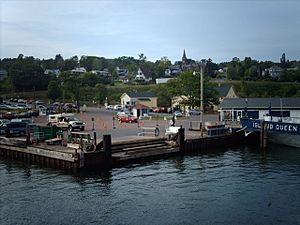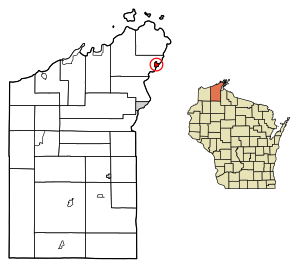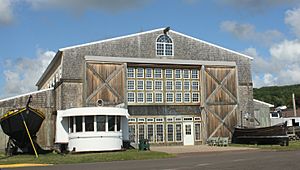Bayfield, Wisconsin facts for kids
Quick facts for kids
Bayfield, Wisconsin
|
|
|---|---|

Bayfield from the harbor
|
|

Location of Bayfield in Bayfield County, Wisconsin.
|
|
| Country | United States |
| State | Wisconsin |
| County | Bayfield |
| Area | |
| • Total | 0.86 sq mi (2.23 km2) |
| • Land | 0.86 sq mi (2.23 km2) |
| • Water | 0.00 sq mi (0.00 km2) |
| Elevation | 830 ft (253 m) |
| Population
(2020)
|
|
| • Total | 584 |
| • Density | 678.3/sq mi (261.9/km2) |
| Time zone | UTC-6 (Central (CST)) |
| • Summer (DST) | UTC-5 (CDT) |
| ZIP codes |
54814
|
| Area codes | 715 and 534 |
| FIPS code | 55-05350 |
| GNIS feature ID | 1582764 |
| Public Transit | Bay Area Rural Transit |
Bayfield is a city in Bayfield County, Wisconsin, United States. The population was 584 at the 2020 census, making it the city with the smallest population in Wisconsin.
Wisconsin Highway 13 serves as a main route in the community. Formerly the county seat and home to industries in lumbering and commercial fishing, today it is a tourist and resort destination referred to as the "Gateway to the Apostle Islands".
Contents
History
Bayfield was named in 1856 for Henry Bayfield, a British Royal Topographic Engineer who explored the region in 1822–23. A post office has been in operation at Bayfield since 1856.
The first Catholic church was built in Bayfield in 1860, with the Franciscans following in 1878. Mass was held in the English and Ojibwe languages. In 1879, the Sisters of St. Francis of Mary Immaculate established an Indian residential school in Bayfield at the request of the Franciscan pastor. Bayfield Mission Boarding and Day School, also known as Holy Family Mission School, included students from the Fond du Lac Band Chippewa and the Saulteaux Ojibwe. In an 1889 report the school's superintendent said that his goals for the school were "civilizing the children and entirely abolishing the use of the Chippewa language." The school operated until 1999.
Geography
Bayfield is located at 46°48.7′N 90°49.2′W / 46.8117°N 90.8200°W (46.8115, -90.8203).
According to the United States Census Bureau, the city has a total area of 0.87 square miles (2.25 km2), of which, 0.86 square miles (2.23 km2) is land and 0.01 square miles (0.03 km2) is water.
Bayfield is the main gateway to the Apostle Islands National Lakeshore, a group of 21 islands in Lake Superior. Madeline Island is the largest of the Apostle Islands and the only one not in the National Lakeshore. A ferry to Madeline Island links Bayfield with La Pointe, Wisconsin, a community on the island.
Climate
| Climate data for Bayfield 6 N, Wisconsin (1991–2020 normals, extremes 1893–2005) | |||||||||||||
|---|---|---|---|---|---|---|---|---|---|---|---|---|---|
| Month | Jan | Feb | Mar | Apr | May | Jun | Jul | Aug | Sep | Oct | Nov | Dec | Year |
| Record high °F (°C) | 57 (14) |
61 (16) |
83 (28) |
89 (32) |
95 (35) |
98 (37) |
104 (40) |
99 (37) |
99 (37) |
88 (31) |
76 (24) |
61 (16) |
104 (40) |
| Mean daily maximum °F (°C) | 21.7 (−5.7) |
26.2 (−3.2) |
37.0 (2.8) |
49.0 (9.4) |
62.8 (17.1) |
71.3 (21.8) |
76.9 (24.9) |
75.5 (24.2) |
67.5 (19.7) |
54.0 (12.2) |
39.6 (4.2) |
27.6 (−2.4) |
50.8 (10.4) |
| Daily mean °F (°C) | 14.4 (−9.8) |
17.2 (−8.2) |
27.5 (−2.5) |
39.6 (4.2) |
51.7 (10.9) |
60.2 (15.7) |
66.4 (19.1) |
65.9 (18.8) |
57.9 (14.4) |
46.0 (7.8) |
32.6 (0.3) |
21.0 (−6.1) |
41.7 (5.4) |
| Mean daily minimum °F (°C) | 7.2 (−13.8) |
8.2 (−13.2) |
17.9 (−7.8) |
30.2 (−1.0) |
40.5 (4.7) |
49.1 (9.5) |
56.0 (13.3) |
56.3 (13.5) |
48.4 (9.1) |
38.0 (3.3) |
25.5 (−3.6) |
14.5 (−9.7) |
32.6 (0.3) |
| Record low °F (°C) | −34 (−37) |
−34 (−37) |
−25 (−32) |
2 (−17) |
17 (−8) |
25 (−4) |
36 (2) |
34 (1) |
27 (−3) |
15 (−9) |
−13 (−25) |
−24 (−31) |
−34 (−37) |
| Average precipitation inches (mm) | 1.70 (43) |
1.12 (28) |
1.61 (41) |
3.08 (78) |
3.49 (89) |
3.34 (85) |
4.11 (104) |
3.64 (92) |
3.69 (94) |
3.15 (80) |
2.44 (62) |
1.92 (49) |
33.29 (846) |
| Average snowfall inches (cm) | 29.5 (75) |
15.8 (40) |
14.6 (37) |
5.1 (13) |
0.8 (2.0) |
0.0 (0.0) |
0.0 (0.0) |
0.0 (0.0) |
0.0 (0.0) |
1.0 (2.5) |
13.3 (34) |
26.2 (67) |
106.3 (270) |
| Average precipitation days (≥ 0.01 in) | 17.5 | 11.4 | 11.8 | 11.0 | 11.8 | 11.9 | 14.1 | 11.2 | 14.3 | 12.8 | 11.9 | 14.2 | 153.9 |
| Average snowy days (≥ 0.1 in) | 19.8 | 12.4 | 9.9 | 4.1 | 0.6 | 0.0 | 0.0 | 0.0 | 0.0 | 0.7 | 9.0 | 15.2 | 71.7 |
| Source: NOAA | |||||||||||||
Demographics
| Historical population | |||
|---|---|---|---|
| Census | Pop. | %± | |
| 1880 | 495 | — | |
| 1890 | 1,373 | 177.4% | |
| 1900 | 1,689 | 23.0% | |
| 1920 | 1,441 | — | |
| 1930 | 1,195 | −17.1% | |
| 1940 | 1,212 | 1.4% | |
| 1950 | 1,153 | −4.9% | |
| 1960 | 969 | −16.0% | |
| 1970 | 874 | −9.8% | |
| 1980 | 778 | −11.0% | |
| 1990 | 686 | −11.8% | |
| 2000 | 611 | −10.9% | |
| 2010 | 487 | −20.3% | |
| 2020 | 584 | 19.9% | |
| U.S. Decennial Census | |||
2020 census
As of the census of 2020, the population was 584. The population density was 678.3 inhabitants per square mile (261.9/km2). There were 458 housing units at an average density of 531.9 per square mile (205.4/km2). The racial makeup of the city was 80.1% White, 11.0% Native American, 0.7% Black or African American, 0.2% Asian, 0.5% from other races, and 7.5% from two or more races. Ethnically, the population was 1.5% Hispanic or Latino of any race.
2010 census
At the 2010 census there were 487 people in 261 households, including 130 families, in the city. The population density was 566.3 inhabitants per square mile (218.6/km2). There were 482 housing units at an average density of 560.5 per square mile (216.4/km2). The racial makeup of the city was 77.8% White, 0.2% African American, 14.8% Native American, 1.0% Asian, and 6.2% from two or more races. Hispanic or Latino of any race were 1.8%.
Of the 261 households, 16.5% had children under the age of 18 living with them, 39.5% were married couples living together, 8.8% had a female householder with no husband present, 1.5% had a male householder with no wife present, and 50.2% were non-families. 44.1% of households were one person and 18.7% were one person aged 65 or older. The average household size was 1.87 and the average family size was 2.58.
The median age was 53.2 years. 15.4% of residents were under the age of 18; 3.2% were between the ages of 18 and 24; 18.6% were from 25 to 44; 36% were from 45 to 64; 26.9% were 65 or older. The gender makeup of the city was 48.9% male and 51.1% female.
Arts and culture
The city of Bayfield is known in the Anishinaabe language as Oshki-oodena ("New-town"), as opposed to Superior, Wisconsin, which is known as Gete-oodena ("Old-town"), in reference to the Ojibwa migration.
The Bayfield Maritime Museum and Bayfield Heritage Museum are the city's two museums. There are several art galleries. Nearby is the 950 seats all-canvas tent theater known as Big Top Chautauqua which during its summer season has hosted such entertainers as Willie Nelson and Lyle Lovett.
Bayfield's annual Apple Fest draws about 60,000 visitors during the first weekend in October. Popular summertime events include the Bayfield Race Week regatta, held during the week of the 4th of July, and the Festival of Arts and Gallery Tour, which takes place the third weekend of July. It features artists from across the midwest, along with tours and demos at a diverse array of local galleries.
Recreation
The Apostle Islands Sled Dog Race takes place the first weekend of February. It is the largest sled dog race in the Midwest, with between 50 and 75 teams competing annually.
Transportation
Bus service to the community is provided by Bay Area Rural Transit.
Media
Bayfield receives three radio stations from Ashland; WATW, WBSZ and WJJH. Television stations come from the Duluth–Superior market; KDLH, KBJR, WDSE and WDIO.
Gallery
-
The headquarters of the Apostle Islands National Lakeshore, in Bayfield, is actually made out of rock quarried from the islands before they were made a park
Notable people
- Laurie E. Carlson, Wisconsin State Representative, 1937–42, born in Bayfield
- Norris J. Nelson, Los Angeles City Council member, 1939–43, born in Bayfield
- Nathan Van Cleave, Composer for Television, including "The Twilight Zone," born in Bayfield
- Lou Alta Melton (1895 – 1974), an American civil engineer and bridge engineer
See also
 In Spanish: Bayfield (Wisconsin) para niños
In Spanish: Bayfield (Wisconsin) para niños











